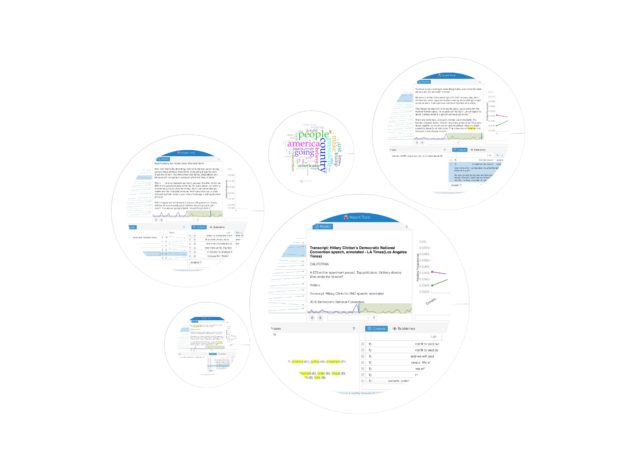I have recently had the opportunity to explore Voyant – an open-source, web-based application for performing text analysis. The two speeches I analyzed were Donald Trump’s RNC speech and Hillary Clinton’s DNC speech. My first step was to visualize the two speeches by entering a URL that linked to them in the Voyant text box, after which I selected two words that related to the shared topic of these speeches to study: “America” and “people.”
Both words appeared in the Cirrus window – a word cloud. Per the Cirrus window, both candidates combined used the word “America” 51 times and “people” 59 times. Clicking on the Trends window enabled me to map the frequency of one word against the other, which revealed that Donald Trump used the term “America” more frequently than Hillary Clinton, but that Hillary Clinton used the term “people” more frequently than Donald Trump. Exploring the Reader window – a viewing window to allow the user to read the full text of the corpus that they have – was the last step of my practicum. For this exercise, I found two meaningful uses of the words “America” and “people” in context. Donald Trump used the word “people” to encompass a specific sector of society, that is, working-class Americans. Hillary Clinton, on the other hand, uses the term to include many sectors of society, though the working-class is certainly one of them. The Phrases window, which displays a list of phrases that feature a selected word, pointed out that Donald Trump used the phrase “America first” more than Hillary Clinton.
I cannot draw many hypothesis or initial conclusions from the pieces I studied based on my explorations of the corpus with Voyant. The information is purely quantitative, and – as with most things digital – the software is not perfect. Voyant put every object from the URLs into the corpus, so some of the words come from picture captions rather than each candidates’ speech. Still, it is interesting to map rhetorical patterns, such as pronoun usage. Whereas Donald Trump frequently used the singular first-person pronoun “I,” Hillary Clinton used the plural first-person pronouns “we” and “us,” which could suggest that the former is a bit of a hothead. Of course, this is an observation that, if I were writing a formal paper, would need more evidence to be proved in a concrete manner.
Voyant as a tool is very accessible. The documentation is thorough and the learning curve is nonexistent, as all you need to access it is an internet connection and the ability to copy and paste URL(s). My only issue with Voyant is its crash frequency. If you click around too quickly, or if the server becomes overloaded, then the page will display a loading bar that never stops loading. But notwithstanding the fragility of the tool, Voyant remains a reliable, user-friendly application for word counts, tag cloud creation, concordancing, and word trending. In other words, Voyant is the quintessential contrivance for digital humanists.

One response to “Voyant – DNC and RNC 2016”
If you were going to use your Voyant visualizations to create a hypthosis, which you can, what would need to change? What would be your next steps? How could you curate your data differently before loading it into the tool or use different functions of the tool, like stop words, to create a better data set?